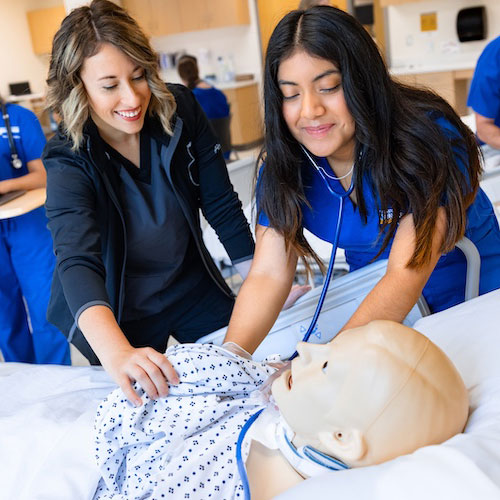UW-Milwaukee PhD nursing alum aspires to improve nursing students’ transition to practice
The UWM School of Nursing’s online PhD program combines science, theory, and research to prepare the next generation of nurse scientists and leaders. Through a research-intensive curriculum, students work alongside expert faculty to advance nursing knowledge and translate research into practice that promotes patient care and health. Graduates of this program are equipped for diverse careers in education, research, and leadership. With close mentorship from professors, students gain the skills to plan and conduct groundbreaking research using a variety of methods, positioning themselves for impactful roles in nursing and healthcare.
PhD nursing alum, Kylateia Farrar-Stern, PhD, MSN, RN, CNE, MEDSURG-BC, is currently a Clinical Assistant Professor in the School of Nursing. Through her own experience entering the nursing world after graduation and teaching courses herself, she realized there is a disconnect in students’ experiences and perspectives for transitioning from being a nursing student to practice. This inspired her to pursue a PhD in Nursing focusing on nursing education. We chatted more with her about this.
Why did you choose the UWM School of Nursing PhD Program?

I have a familiarity with UWM since I did my undergrad here. I was part of the Nursing Scholars Program and aware of all the resources and support that exists. Plus I was already teaching as a clinical instructor. Knowing who I was going to be working with and having established those relationships, I thought UWM would be a good place. It was also recently awarded the R1 designation, and that’s something that I felt made it more prestigious to get a degree from UWM. I did consider other places, but it always comes back to who’s going to be helpful.
My area of research was also in nursing education, and I saw that UWM had some people that aligned with that area of research. I was drawn to the online program because I really appreciated the flexibility of not having to always sit in a classroom.
What are some highlights about the program you enjoyed?
I thought it was great that I had to present or attend conferences through the program. It’s a great way to learn the process and be more confident in your dissertation and conducting it. I was able to build a research study from the beginning, disseminate my findings, and be on a research team and ended up having two national conference presentations.
Tell me more about your focus in nursing education and why you decided to pursue a PhD in it?
As a new graduate nurse, I realized the transition to practice can sometimes be an issue. Plus in my first job I received some feedback that I would make a good educator. For example one of the things I learned was putting in IVs with an ultrasound machine and I found that more often than not my peers would come to me versus the other trainer just for the sheer interaction of how they were actually taught.
Through teaching at UWM, I taught a Transition to Practice class and it always seemed to be a conversation that school isn’t preparing me enough to go into my first job. It always came back to the school and never the perspective of it, not looking at it as an opportunity to grow after they start their job. And it got me thinking, what are our students’ perspectives? So my dissertation title was “Nursing students’ perceptions and lived experiences of their theoretical academic preparation.” Looking at what they’re getting in the classroom, and how is that shaping their thoughts later on in the program? We found that nursing instructors are way more impactful than I would have originally anticipated with how they give resources, how they embed themselves in their classes, the expectations that they set around assignments and doing well.
Now that I’ve completed that, a lot of what I’m doing now is thinking about how are we teaching? What does that look like? I’m involved with the MN program with the essential work as we change the curriculum. I just finished writing a manuscript about lifelong learning and what that looks like in the classroom and making case study discussions to really get students engaged and thinking about what is that next step or what does that look like in 5-10 years from now.
What advice would you give people who are debating pursuing a PhD in Nursing? Who makes a good candidate to pursue a PhD?
It’s going to take “x” amount of time, so whether you start now or later, it’s still going to end up getting done…so start now. Everyone’s journey is different, but there are great opportunities in the program and you’ll grow as an individual. It’s all part of your job and all goes towards improving nursing, the profession and science of it.
If you recognize things might be lacking in one way or another and you want to cultivate change…a PhD will help you do just that. It can be a practice change, a teaching change. That PhD will get you in front of the right people at the right time and it will help unlock doors and create the change that you aspire.
Anything else you’d like to add?
Just some words of wisdom. There are a lot of program checkpoints – the qualifying exam, the comprehensive exam, the proposal, your defense. Those things are going to feel like a mountain that you’re climbing, but at the same time they’re going to make you a better person in the long run. It’s kind of a trust-the-process thing. It’s there for a reason, it will help you. You’re going to grow, and by the time you get to the end of the tunnel, you’re going to look back and say “wow, look what I did!”
